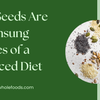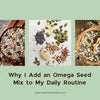The Nutritional Power of Dried Fruits: Natural Sweetness with Benefits
- by S R
The Nutritional Power of Dried Fruits: Natural Sweetness with Benefits
In the world of healthy snacking, few options strike the balance between convenience and nutrition quite like dried fruits. Naturally sweet, portable, and long-lasting, dried fruits have been a dietary staple for centuries—and for good reason. But what exactly makes them so special?
In this post, we’ll explore the health benefits, nutritional value, and smart ways to include dried fruits in your daily routine.
What Are Dried Fruits?
Dried fruits are simply fresh fruits with most of their water content removed through sun drying or dehydrators. This process concentrates their flavor, sugars, and nutrients, making them a powerful snack in a small package.
Common dried fruits include:
Nutritional Highlights
While each dried fruit has its own unique profile, here are some of the general nutritional benefits they share:
Natural Sugars for Quick Energy
-
Dried fruits are naturally high in fructose and glucose, making them a great energy-boosting snack for athletes, hikers, or anyone needing a quick pick-me-up.
Fiber-Rich
The dehydration process keeps the fiber intact. Fiber helps:
- Promote digestion
- Maintain regularity
- Support a healthy gut microbiome
Packed with Micronutrients
Dried fruits are rich in:
- Potassium – supports heart and muscle function
-
Iron – helps prevent fatigue and anemia
- Magnesium – involved in over 300 enzymatic reactions
- Vitamin A and C (especially in dried apricots and mangoes)
- Antioxidants – particularly polyphenols, which reduce oxidative stress
Top Dried Fruits & Their Benefits
Raisins :
- High in potassium and iron
- Support heart health and digestion
Dried Apricots
- Rich in vitamin A and beta-carotene
- Great for skin and eye health
Dates
- Natural source of glucose and fructose
- Great for energy and bone strength (rich in calcium and phosphorus)
Prunes
- Famous for digestive support
- Contain compounds that may support bone density
Figs
- Excellent source of calcium and fiber
- Support gut and bone health
Health Considerations
While dried fruits are nutrient-dense, it’s important to consume them mindfully:
1. Watch for Added Sugars
Some commercial varieties (like sweetened cranberries or mangoes) are coated in added sugar. Always check the ingredient label and opt for unsweetened versions when possible.
2. Portion Control Matters
Because they’re compact and sweet, dried fruits are easy to overeat. A small handful (about ¼ cup) is typically a healthy serving.
3. Sulfur Dioxide Sensitivity
Some dried fruits (like apricots) are treated with sulfur dioxide to preserve color. While safe for most people, it may cause issues for those with asthma or sulfite sensitivity. Look for "unsulfured" versions if needed.
How to Enjoy Dried Fruits
Here are a few delicious and nutritious ways to add dried fruits to your meals:
-
Breakfast: Add raisins or dried cranberries to oatmeal or yogurt.
-
Salads: Toss dried figs or apricots into green salads for a sweet contrast.
-
Snacks: Pair dates or dried mango with nuts for a balanced snack.
-
Baking: Use prunes or dates as natural sweeteners in baked goods.
-
Trail Mix: Mix with seeds, dark chocolate, and almonds for an on-the-go snack.
Final Thoughts
Dried fruits offer the best of both worlds—natural sweetness and powerful nutrition. They’re rich in fiber, vitamins, and antioxidants, making them a smart addition to a balanced diet. Just be mindful of portions and added sugars, and you’ll be reaping the benefits in no time.





